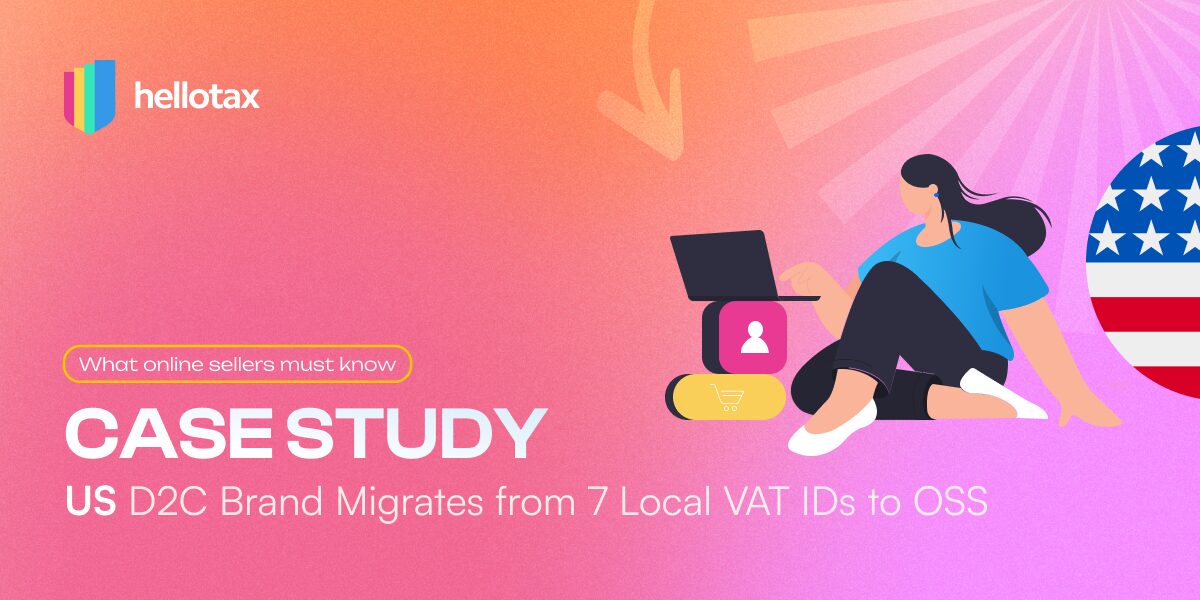Online sellers from outside the EU who want to trade within the European Union must comply with a variety of regulations. This often leads to difficulties, especially when it comes to topics like VAT or customs. The right service provider can help to overcome these problems.
Antonia Klatt
Last Updated on 11 January 2025
What do non-EU sellers have to consider?
Sellers who are not established in the EU, but who want to import into the European Union or sell their products on the domestic market, have to face a number of legal and logistical challenges.
Naturally, the relevant processes involved are often easier for EU businesses in Europe than they are for non-EU businesses. It is therefore all the more important to take care of tasks in time – whether it’s related to VAT registration, customs, or something else.
As we want to talk about the customs-related duties of non-EU sellers in Europe, let’s start with the legal regulations.
Lodging a customs declaration
In accordance with art. 170 para. 1 UCC (Union Customs Code), customs declarations can in principle be made by anyone who has the required information. Further, according to paragraph 2, the declarant must be resident in the customs territory of the European Union. The following declarants shall not be required to be established in the EU customs territory:

- persons who lodge a customs declaration for transit or temporary admission;
- persons, who occasionally lodge a customs declaration, including for end-use or inward processing, provided that the customs authorities consider this to be justified;
Declarations shall be made using electronic data-processing techniques. Explanation supported by examples on data requirements are modelled in EUCDM Guidance Document.
Make sure you meet one of these conditions if you are not established in the customs territory of the EU. If that’s no possible, there is one other solution: a
customs representative.
Tax Guide to sell in EU for non-EU companies
Customs Representative
A customs representative can be a great solution for sellers who cannot or don’t want to meet the restrictions mentioned above. In accordance with art. 18 para. 1 of the UCC, any person may appoint a customs representative.
Such representation may be either direct, in which case the customs representative shall act in the name of and on behalf of another person, or indirect, in which case the customs representative shall act in his or her own name but on behalf of another person.
Method of customs valuation
According to art 70(1), the primary basis for the customs value of goods is the transaction value. The transaction value is the price actually paid or payable for the goods when sold for export to the customs territory of the Union.
Consequences of the shift on the selling price
Using two examples with imports from China, the consequences of the shift to the selling price basically looks like this:
| Example 1 – Import of textiles from China (CIF) | Example 2 – Import of plastic articles from China (CIF) | |
| Purchase price of the goods: | 10 000.00 € | 5 000.00 € |
| Selling price of the goods: | 50 000.00 € | 25 000.00 € |
| Customs duty: | 12 % | 6,5 % |
| Customs duties on purchase price: | 1.200.00 € | 325.00 € |
| Acquisition tax on purchase price | 2 128.00 € | 1 011.75 € |
| Customs on selling price: | 6 000.00 € | 1 625.00 € |
| Acquisition tax on selling price: | 10 640.00 € | 5 058.75 € |
Solution: customs service provider
When it comes to product labelling, product liability and the EEA address of the distributor, the Act on making products available on the market (Product Safety Act) applies.
It is required that the name and contact address of the manufacturer or, if not established in the European Economic Area, the name and contact address of the authorised representative or of the importer must be provided.

As already mentioned, it makes sense to get in touch with customs experts and outsource these processes. This way, the workload can be reduced, the customs are handled properly and sellers can focus on other important aspects of their businesses.
If you are looking for a reliable customs partner, we recommend the customs experts of hellocustoms.

They take over the liability address, become distributors and are even liable. So you don’t have to handle your customs-related tasks anymore and customs clearance.
Overview: hellocustoms
To give an idea on what the services of hellocustoms look like and how they can be useful when it comes to importing goods into the European Union, this is what the procedure looks like.
- Initial consultation
- Determining concrete product and sending information about it
- Tariff classification, determination of customs rates and examination of import regulations
- Sending of a packaging design + checking of the design
- If the check is positive, the release follows and production can begin
- Informing the forwarder that customs clearance may be carried out
- Providing documents (invoice from supplier, invoice, packing list, freight documents)
- Customs clearance after arrival of the goods in the EU
If you are looking for a customs partner that offers customs clearance and market launch services, hellocustoms is the partner to choose.


